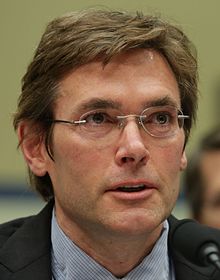Marc Edwards | |
|---|---|
 Edwards testifying during the Flint water crisis hearing, March 2016 | |
| Born | 1964 (age 59–60) |
| Nationality | American |
| Education | State University of New York at Buffalo (B.S.) University of Washington (M.S., Ph.D.) |
| Alma mater | State University of New York at Buffalo University of Washington |
| Occupation | Professor |
| Employer | Virginia Tech |
| Known for | Water-supply safety and engineering |
| Title | Charles P. Lunsford Professor of Civil and Environmental Engineering |
| Term | August 23, 2004–present |
| Predecessor | Clifford Randall |
| Board member of | Association of Environmental Engineering and Science Professors (president, 2001–2005) |
| Children | 2 |
| Awards | MacArthur Fellow, 2007 Outstanding Faculty Award, 2007 Praxis Award in Professional Ethics, 2010 |
Marc Edwards (born 1964) is a civil engineering/environmental engineer and the Charles Edward Via Professor of Civil and Environmental Engineering at Virginia Tech.[1] An expert on water treatment and corrosion, Edwards's research on elevated lead levels in Washington, DC's municipal water supply gained national attention, changed the city's recommendations on water use in homes with lead service pipes, and caused the Centers for Disease Control and Prevention to admit to publishing a report so rife with errors that a congressional investigation called it "scientifically indefensible." He is considered one of the world's leading experts in water corrosion in home plumbing,[2] and a nationally recognized expert on copper corrosion.[3] He is also one of the whistleblowers in the Flint water crisis, along with Dr. Mona Hanna-Attisha.
Edwards was named a MacArthur Fellow in 2007.[4] The program cited him for "playing a vital role in ensuring the safety of drinking water and in exposing deteriorating water-delivery infrastructure in America’s largest cities."[4] In 2004, Time magazine featured him as one of the United States' most innovative scientists.[5]
- ^ "Welcome to the homepage of Marc Edwards". Faculty. Blacksburg, VA: Virginia Tech. May 19, 2011. Retrieved June 15, 2011.
- ^ Cite error: The named reference
prismwas invoked but never defined (see the help page). - ^ "Pinhole Leaks in Copper Pipes". Research. Laurel, MD: Washington Suburban Sanitary Commission. Archived from the original on May 20, 2011. Retrieved June 15, 2011.
- ^ a b "Marc Edwards". MacArthur Fellows 2007. Chicago: John D. and Catherine T. MacArthur Foundation. September 2007. Archived from the original on October 27, 2011. Retrieved June 15, 2011.
- ^ August, Melissa (April 12, 2004). "The Plumbing Professor: getting the lead out". Time. New York. Archived from the original on April 8, 2004. Retrieved June 15, 2011.